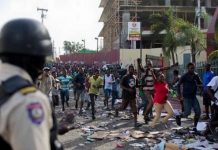by the Center for Economic and Policy Research
Last week, the Inter-American Commission on Human Rights (IACHR) granted precautionary measures in favor of the 567 families that have been under constant threat of eviction in the Grace Village camp. Given the “imminent” threat to those in the camp, the IACHR urged the Government of Haiti:
1. To adopt the necessary measures to avoid the excessive use of force and of violence in any eviction. In particular, to guarantee that the public authorities’ actions as well as those of private parties pose no risk to the life and personal integrity of the camp residents;
2. To implement effective security measures, in particular, to ensure that there is an adequate patrol around and inside the camp and to install police stations close to the camp. To this effect, the IACHR asks the Government to provide special protection to women and children;
3. To ensure that the residents have access to the potable water required for basic needs;
4. To consult with the beneficiaries and their representatives regarding the measures that need to be taken. In particular, ensure that the camp residents’ committee as well as grassroots women’s groups can fully participate in the planning and execution of the measures implemented for the benefit of residents, including measures focused on the prevention of sexual violence and other forms of violence in the camp; and
5. To inform [the public] regarding the adopted measures so as to investigate the events that justifies the adoption of precautionary measures
As we have written previously, the residents of Grace Village have faced significant and on-going harassment, which has included government complicity at both the local and national level. The alleged owner of the land is Pastor Joel Jeune, the founder of a Florida based 501(c)(3) organization, Grace International Inc. As the request for precautionary measures points out, the pastor’s close “ties to the mayor’s office and the local police force him to enlist the help of Haitian police to carry out illegal evictions. With his private security forces and the Haitian police, Pastor Joel Jeune has orchestrated and participated in violent, forced evictions of displaced families living inside Grace Village.”
Amnesty International had warned earlier this month that the camp was “under threat of forced eviction” and that there was a “list of people from the camp” that the police were going to arrest. Amnesty urged the Haitian government to “ensure that residents of Grace Village camp are not evicted without due process, adequate notice and consultation, and that all those affected have access to adequate alternative accommodation.”
In requesting the precautionary measures, human rights lawyers Mario Joseph, Patrice Florvilus and Nicole Phillips argue that:
the Haitian government’s failure to protect a vulnerable group, while simultaneously assisting non-state actors in brutalizing this vulnerable group, violates the Equal Protection clause enshrined in Article 24 of the American Convention on Human Rights. Finally, the Haitian government’s failure to protect displaced families in Grace Village from forced evictions interferes with these individuals’ exercise of fundamental rights, including the right to life, personal liberty, privacy, family, property, and judicial protection, as guaranteed by the Inter-American Convention.
The recommendations by the IACHR “reconfirm that forced evictions from displacement camps not only add trauma to earthquake victims, but also violate Haitian and international human rights standards,” said Nicole Phillips of the Institute for Justice and Democracy in Haiti. She added, “landowners should raise their concerns with the Haitian government and international community who have not provided adequate housing to earthquake victims, rather than waging violence against displaced communities desperate to find a safe home.”
Meanwhile, in Haiti on Mar. 28, hundreds and perhaps thousands of displaced persons marched for adequate housing and against forced evictions. Bri Kouri Nouvèl Gaye, which tweeted updates from the march, noted that, “Each time the IDP protest passes a camp the number of people grows; was several hundreds, now thousands.” According to the UN, over 70,000 people (20% of the total displaced population) are facing threats of eviction in 2013.

Hundreds of IDP camp residents marched through Port-au-Prince on Mar. 28 to protest against threats and evictions.
Photo by: Bri Kouri Nouvel Gaye





